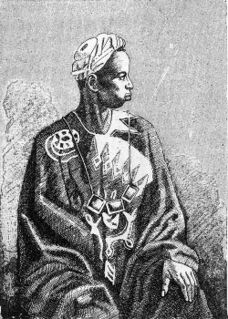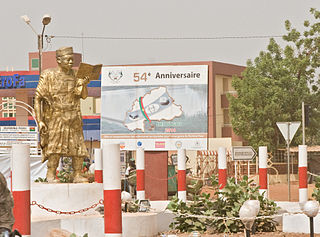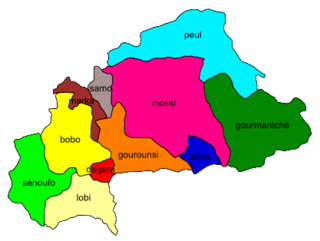| Part of a series on the |
| Culture of Burkina Faso |
|---|
 |
| History |
| People |
| Languages |
| Cuisine |
| Religion |
| Art |
| Literature |
Music and performing arts |
| Sport |
Monuments |
Symbols |
Burkinabé literature grew out of oral tradition, which remains important. In 1934, during French occupation, Dim-Dolobsom Ouedraogo published his Maximes, pensées et devinettes mossi (Maxims, Thoughts and Riddles of the Mossi), a record of the oral history of the Mossi people. The oral tradition continued to have an influence on Burkinabé writers in the post-independence Burkina Faso of the 1960s, such as Nazi Boni and Roger Nikiema. The 1960s saw a growth in the number of playwrights being published. Since the 1970s, literature has developed in Burkina Faso with many more writers being published.

Oral tradition, or oral lore, is a form of human communication wherein knowledge, art, ideas and cultural material is received, preserved and transmitted orally from one generation to another. The transmission is through speech or song and may include folktales, ballads, chants, prose or verses. In this way, it is possible for a society to transmit oral history, oral literature, oral law and other knowledge across generations without a writing system, or in parallel to a writing system. Religions such as Buddhism, Hinduism and Jainism, for example, have used an oral tradition, in parallel to a writing system, to transmit their canonical scriptures, secular knowledge such as Sushruta Samhita, hymns and mythologies from one generation to the next.

France, officially the French Republic, is a country whose territory consists of metropolitan France in Western Europe and several overseas regions and territories. The metropolitan area of France extends from the Mediterranean Sea to the English Channel and the North Sea, and from the Rhine to the Atlantic Ocean. It is bordered by Belgium, Luxembourg and Germany to the northeast, Switzerland and Italy to the east, and Andorra and Spain to the south. The overseas territories include French Guiana in South America and several islands in the Atlantic, Pacific and Indian oceans. The country's 18 integral regions span a combined area of 643,801 square kilometres (248,573 sq mi) and a total population of 67.3 million. France, a sovereign state, is a unitary semi-presidential republic with its capital in Paris, the country's largest city and main cultural and commercial centre. Other major urban areas include Lyon, Marseille, Toulouse, Bordeaux, Lille and Nice.

The Mossi are a people in central Burkina Faso, living mostly in the villages of the Nazinon and Nakanbe River Basin. The Mossi are the largest ethnic group in Burkina Faso, constituting more than 40% of the population, or about 6.2 million people. The other 60% of Burkina Faso's population is composed of more than 60 ethnic groups, mainly the Gurunsi, Senufo, Lobi, Bobo and Fulani. The Mossi speak the Mòoré language.











